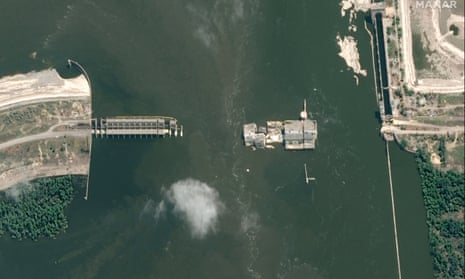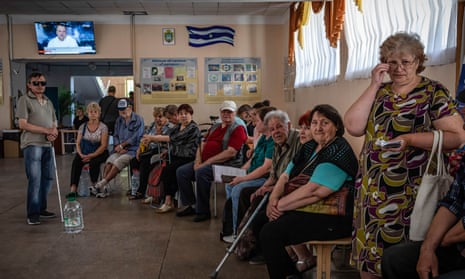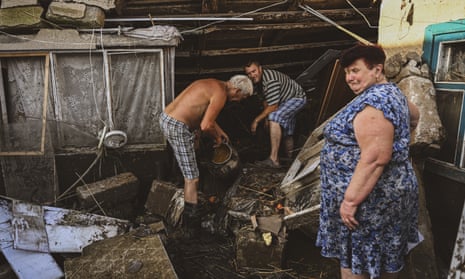UN accuses Russia of blocking access to flood-hit areas
The UN has accused Russia of refusing to allow aid deliveries to Moscow-controlled areas affected by flooding following the destruction of the Kakhovka dam almost two weeks ago.
“The government of the Russian Federation has so far declined our request to access the areas under its temporary military control,” Denise Brown, the UN’s humanitarian coordinator for Ukraine, said in a statement.
“The UN will continue to engage to seek the necessary access. We urge the Russian authorities to act in accordance with their obligations under international humanitarian law.
“Aid cannot be denied to people who need it.”
The statement comes as Ukrainian and Russian authorities said the death toll from the flooding had risen to 52. Russian officials said 35 people had died in Moscow-controlled areas and Ukraine‘s interior ministry said 17 had died and 31 were missing, Reuters reported. More than 11,000 have been evacuated on both sides.
The collapse of the Moscow-controlled dam on 6 June unleashed floodwaters across southern Ukraine and Russia-occupied parts of the Kherson region, destroying homes and farmland, and cutting off supplies to residents.
A team of international legal experts assisting Ukraine’s prosecutors in their investigation said it was “ highly likely” the dam’s collapse was caused by explosives planted by Russians.
Key events
Ukrainian forces may be “temporarily pausing counteroffensive operations to reevaluate their tactics”, the Institute for the Study of War says in its latest assessment of the conflict.
It quoted the head of the Estonian Defense Forces Intelligence Center, Colonel Margo Grosberg, as saying on Friday that he believes “we won’t see an offensive over the next seven days.”
The thinktank noted: “Operational pauses are a common feature of major offensive undertakings, and this pause does not signify the end of Ukraine’s counteroffensive.”
It said Ukraine had “continued counteroffensive actions on at least four sectors of the front” on Sunday and “made limited territorial gains”.
Russia had the “means, motive and opportunity” to bring down the Kakhovka dam earlier this month, the Associated Press newswire has reported, citing access to exclusive photos and drone footage.
It writes:
In the days leading up to the single explosion, Ukrainian military drone videos showed dozens of Russian soldiers encamped on a bank of the Dnieper, relaxed as they walked back and forth to the dam with no cover – suggesting their confidence in their control of the area and especially the dam, which was strategically crucial.
The photos, taken from Ukrainian drone footage, obtained by the AP and dated May 28, showed a car parked on the dam, its roof neatly cut open to reveal enormous barrels, one with what appears to be a land mine attached to the lid and a cable running toward the Russian-held side of the river. It’s not clear how long the car remained.
A Ukrainian special forces communications official, who also noted the car appeared to be rigged, said he believed the purpose of that was twofold: to stop any Ukrainian advance on the dam and to amplify the planned explosion originating in the machine room and destroy the top of the dam. The car bomb itself would not have been enough to bring down the dam. The official spoke on condition of anonymity to preserve operational secrecy.
The explosion detected at 2:54 a.m. local time [on 6 June] registered on Norwegian seismic monitors at nearly magnitude 2. By comparison, a catastrophic explosion at Beirut’s port that killed scores of people and caused widespread destruction registered at a 3.3 on the seismic scale and involved at least 500 tons of explosives.
“That means it’s a significant explosion,” said Anne Strømmen Lycke, CEO of the Norwegian earthquake monitoring agency NORSAR.
Within a few minutes, water from the Kakhovka reservoir began cascading through the shattered dam, submerging the river’s sand bar islands and flooding much of southern Ukraine, including Russian-controlled territory.

UN accuses Russia of blocking access to flood-hit areas
The UN has accused Russia of refusing to allow aid deliveries to Moscow-controlled areas affected by flooding following the destruction of the Kakhovka dam almost two weeks ago.
“The government of the Russian Federation has so far declined our request to access the areas under its temporary military control,” Denise Brown, the UN’s humanitarian coordinator for Ukraine, said in a statement.
“The UN will continue to engage to seek the necessary access. We urge the Russian authorities to act in accordance with their obligations under international humanitarian law.
“Aid cannot be denied to people who need it.”
The statement comes as Ukrainian and Russian authorities said the death toll from the flooding had risen to 52. Russian officials said 35 people had died in Moscow-controlled areas and Ukraine‘s interior ministry said 17 had died and 31 were missing, Reuters reported. More than 11,000 have been evacuated on both sides.

The collapse of the Moscow-controlled dam on 6 June unleashed floodwaters across southern Ukraine and Russia-occupied parts of the Kherson region, destroying homes and farmland, and cutting off supplies to residents.
A team of international legal experts assisting Ukraine’s prosecutors in their investigation said it was “ highly likely” the dam’s collapse was caused by explosives planted by Russians.
Opening summary
Hello and welcome to the Guardian’s live coverage of the war in Ukraine with me, Helen Livingstone.
The UN has accused Moscow of continuing to block humanitarian aid deliveries to Russian-occupied areas in eastern Ukraine that have been affected by the destruction of the Kakhovka dam earlier this month.
“We urge the Russian authorities to act in accordance with their obligations under international humanitarian law. Aid cannot be denied to people who need it,” the UN humanitarian coordinator for Ukraine, Denise Brown, said in a statement.
The death toll from flooding caused by the collapse of the dam has risen to 52, with authorities in Kyiv reporting 17 dead and 31 missing and Russian officials saying 35 people had died in Moscow-controlled areas.

In other key developments:
-
Russia had the means, motive and opportunity to bring down the dam, according to exclusive drone photos and information obtained by the Associated Press newswire. Images taken from above the dam appeared to show an explosive-laden car atop the structure, and two officials said Russian troops were stationed in a crucial area inside the dam where the Ukrainians say the explosion that destroyed it was centred, AP reported. The Russian Defense Ministry did not immediately respond to a request for comment from the news agency.
-
Ukraine has recaptured the village of Piatykhatky, in the southern Zaporizhzhia region, reports suggest. It would be the second gain in the area since Kyiv launched its counteroffensive earlier this month. A Russian-installed official said Ukrainian forces had taken the settlement and were entrenching themselves there while coming under fire from Russian artillery, Reuters reported. If confirmed, this is Ukraine’s first village gain for nearly a week, and marks an apparent escalation of the offensive on the most direct route to Crimea.
-
Russia’s defence ministry claimed in its daily update its forces had repelled a series of Ukrainian attacks across three sections of the 1000-km-long frontline and made no mention of Piatykhatky, Reuters reports. The battlefield reports could not be independently verified.
-
President Volodymyr Zelenskiy has praised Ukrainian forces for their “very effective” repelling of enemy assaults near Avdiivka, one of the focal points of fighting in the east, in his nightly video address. The head of the military administration in Avdiivka, a mining town shattered by months of fighting, told national television that Ukrainian forces had advanced about one km (two-thirds of a mile) around the town over the past two weeks.
-
The EU is speeding up arms deliveries to Ukraine to support the counteroffensive against Russian forces, the EU industry chief Thierry Breton told the French daily Le Parisien. He said the EU would be stepping up its efforts, pledging that 1m high-caliber weapons must be provided within the next year.
-
The UK Ministry of Defence said heavy fighting continues to be focused in Zaporizhzhia oblast, western Donetsk oblast and around Bakhmut. It says both sides are taking high casualties, with Russian losses likely to be the highest since the peak of the battle for Bakhmut in March. It also noted that Russian defence operations had been “relatively effective in the south”.
-
Ukrainian forces have destroyed an ammunition depot near the Russian-occupied port city of Henichesk, in the southern region of Kherson, a spokesperson for the Odesa military administration said on Sunday.
-
South African president Cyril Ramaphosa sought to present an African peace mission to Moscow and Kyiv in a positive light, tweeting “Africa Peace Initiative has been impactful and its ultimate success will be measured on the objective, which is stopping the war”. The Kremlin has said the plan will be “difficult to realise” while Zelenskiy said allowing negotiations now would just “freeze the war”. The African delegation is the first since the start of the war to hold separate face-to-face talks with both leaders on their peace initiative.

